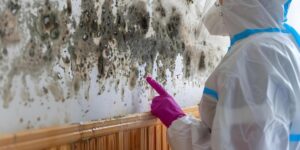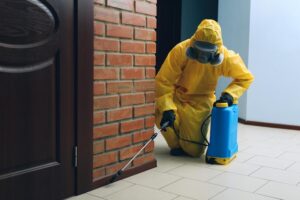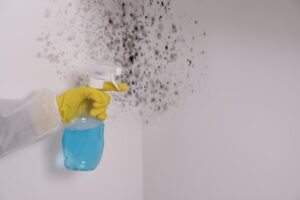
Penicillium mold removal costs can vary depending on the extent of the infestation and the required remediation steps. Understanding these costs upfront can help homeowners budget for the necessary treatments to ensure a safe and mold-free environment.
Penicillium Mold Cost |
| Average Cost | $4,000 |
| Highest Cost | $6,000 |
| Lowest Cost | $1,000 |
What is Penicillium Mold?
In Fort Myers, FL, Penicillium mold is a type of fungus commonly found in damp or water-damaged areas, such as basements, bathrooms, and kitchens. Known for its blue, green, or white hues, Penicillium spreads quickly and can cause respiratory issues, allergic reactions, and other health problems.
Why Understanding Costs Matters
When dealing with mold, understanding costs ensures you make informed decisions about protecting your home and health. Proper budgeting allows homeowners to address issues promptly, avoiding more significant expenses from worsening damage or health risks.
By knowing the Penicillium Mold Remediation expenses, you can prioritize repairs, choose the right professionals, and set aside funds for potential additional costs like structural restoration.
Transparency in costs empowers you to avoid unexpected financial burdens and ensures the mold remediation process is efficient and thorough, safeguarding your investment in your property.
Penicillium Mold Removal Cost VS Other types of molds Removal Cost
| Mold Type | Cost Range | Details |
| Black Mold Removal Cost | $2,000 – $10,000 | Toxic mold with significant health risks, often requires extensive removal. |
| Alternaria mold Removal Cost | $1,500 – $6,000 | Common indoor mold is found on fabrics, walls, and carpets. |
| Cladosporium mold Removal Cost | $1,000 – $5,000 | Non-toxic but can cause allergic reactions; thrives on damp wood or fabrics. |
| Penicillium mold Removal Cost | $1,000 – $4,000 | Known for spreading quickly; often found in water-damaged buildings. |
| Aspergillus mold Removal Cost | $500 – $4,000 | Common household mold; can cause irritation and allergic responses. |
| Fusarium mold Removal Cost | $1,500 – $6,500 | Found on water-damaged materials, poses health risks to respiratory systems. |
| Toxigenic Mold Removal Cost | $3,000 – $10,000+ | Produces mycotoxins; removal requires specialized treatments. |
| Outdoor Mold Removal Cost | $500 – $3,000 | Found on external structures; removal focuses on environmental control. |
| Common Indoor Mold Removal Cost | $1,000 – $4,500 | Includes various non-toxic molds causing mild allergic reactions. |
Factors Affecting Penicillium Mold Cleanup Cost
Size of the Affected Area
The cost increases with the size of the mold-infested area. A small patch may require minimal work, while extensive infestations demand more resources and time.
Severity of the Infestation: Severe infestations often involve structural damage, which adds to the overall Penicillium mold treatment price.
Location of Mold Growth: Mold in hard-to-reach areas, such as behind walls or within HVAC systems, increases labor costs and equipment use.
Inspection and Testing: Mold inspections typically cost $200 to $600, depending on the location and extent of testing required.
Professional vs. DIY Approach: While DIY mold removal is an option for minor infestations, hiring professionals ensures thorough remediation and reduces long-term risks.
DIY vs. Professional Mold Removal
DIY Approach
While tackling minor Penicillium mold infestations on your own might seem cost-effective, it comes with risks. Penicillium mold treatment price can skyrocket if mold is not completely removed or if it reappears due to improper cleaning. DIY removal is best suited for small, contained areas.
However, it’s crucial to invest in protective gear, such as gloves, masks, and eye protection, to avoid inhaling spores. Keep in mind that insufficient treatment could lead to further damage or mold spread, making professional intervention necessary later.
Hiring Professionals
Opting for professionals to handle Penicillium mold cleanup cost might seem like a larger upfront expense, but the benefits far outweigh the initial cost. Mold removal experts bring years of experience, industry-standard tools, and mold-resistant solutions to ensure complete eradication.
Professionals offer a thorough assessment and use specialized equipment like HEPA vacuums and air scrubbers to prevent spores from spreading. With their expertise, you’re more likely to achieve long-term results, reducing the likelihood of recurring mold growth.
The Penicillium Mold Remediation expenses paid for professional services often save you money in the long run by protecting your home from further mold damage and related health issues.
Step-by-Step Penicillium Mold Removal Process
Inspection and Testing
The process begins with a thorough inspection by professionals to identify the source of moisture and assess the full extent of the Penicillium mold infestation. Mold tests may be conducted to determine the type of mold present and its spread.
Containment: Next, the affected area is sealed off to prevent spores from dispersing into uncontaminated parts of the home. Plastic sheeting and negative air pressure systems are typically used to ensure mold doesn’t spread.
Removal of Mold: Once contained, professionals will remove visible mold by scrubbing affected surfaces or, if necessary, replacing materials like drywall or insulation that are too contaminated to clean.
Air Filtration: Advanced air filtration systems, such as HEPA air scrubbers, are employed to capture airborne mold spores, ensuring that the air quality is restored to safe levels.
Disinfection and Sanitization: After physical removal, antimicrobial treatments are applied to all affected surfaces to eradicate any remaining mold traces and prevent regrowth.
Addressing Moisture Issues: Finally, moisture problems—such as leaks or poor ventilation—are addressed. This may involve repairing plumbing leaks, improving drainage systems, or enhancing ventilation in areas prone to dampness to prevent future mold growth.
Tips to Reduce Mold Cleanup Costs
Address Mold Early: The earlier you catch mold, the less damage it causes. Small infestations are easier and cheaper to remove than large, widespread growths. By tackling mold promptly, you save on extensive cleanup and restoration costs.
Fix Water Issues Promptly: Penicillium mold thrives in moist environments, so addressing leaks and drainage problems immediately is crucial. By fixing these issues quickly, you prevent mold from spreading and potentially needing expensive remediation services.
Schedule Regular Inspections: Routine inspections of damp areas, such as basements, bathrooms, and attics, can catch mold early before it becomes a bigger problem. Detecting mold early minimizes damage, reduces the need for extensive cleaning, and ultimately saves on Penicillium mold cleanup costs.
Get Multiple Quotes: When hiring professionals for Penicillium mold remediation, get multiple quotes to compare prices. This helps you find the best service at a reasonable Penicillium mold treatment price. Don’t settle for the first offer—investing time in comparisons can result in significant savings without compromising quality.
Conclusion

In Fort Myers, FL, Penicillium mold is a serious concern that demands immediate attention. Understanding the Penicillium mold treatment price and the factors influencing costs can help homeowners make informed decisions. Whether you choose a DIY solution or hire professional contractors, addressing the mold issue early saves money and protects your family’s health.
FAQs
The average Penicillium mold cleanup cost ranges from $500 to $6,000, depending on the infestation’s size and severity.
Insurance may cover mold removal if it resulted from a covered peril, such as a burst pipe. However, damage caused by neglect is typically not covered.
While minor mold issues can be handled DIY, professional mold removal is recommended for larger infestations to ensure complete eradication and safety.
Addressing moisture problems, fixing leaks, improving ventilation, and maintaining humidity levels below 60% are effective preventive measures to avoid future growth.
A professional inspection includes assessing affected areas, using moisture meters to detect hidden mold, and determining the best treatment plan based on the severity and location of the mold infestation.
